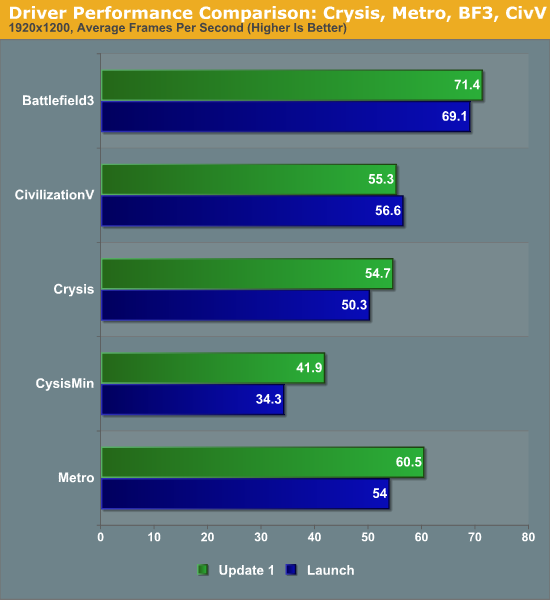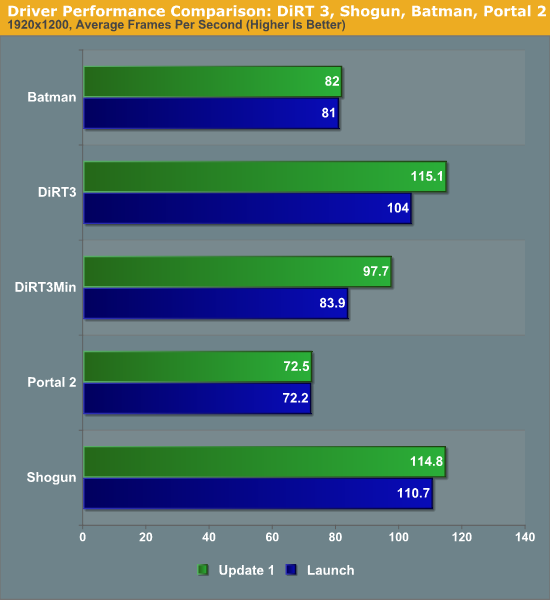AMD Radeon HD 7950 Review Feat. Sapphire & XFX: Sewing Up The High-End Market
by Ryan Smith on January 31, 2012 9:02 AM ESTGetting the Most Out of GCN: Driver Improvements
With the launch of any new architecture there’s still a lot of room for improvement on the part of driver developers, and GCN is no exception. On January 20th AMD released the first driver update for the 7000 Series, which brought with it an interesting mix of bug fixes, new features, and performance improvements. On the feature side AMD enabled support for Analytical Anti-Aliasing and Super Sample Anti-Aliasing for DX10+ games, an overdue feature that we’re very happy to see finally make it to AMD cards. Meanwhile on the performance side the new drivers improved the performance of the 7000 series in several games. Game performance typically rises slowly over time, but as this is one of the first post-launch driver releases, the gains are larger than what we’re used to seeing farther down the line.
To get an idea of where performance has improved and by how much, we reran our entire benchmark suite on the 7970.


As to be expected, at this point in time AMD is mostly focusing on improving performance on a game-by-game basis to deal with games that didn’t immediately adapt to the GCN architecture well, while the fact that they seem to be targeting common benchmarks first is likely intentional. Crysis: Warhead is the biggest winner here as minimum framerates in particular are greatly improved; we’re seeing a 22% improvement at 1920, while at 2560 there’s still an 11% improvement. Metro:2033 and DiRT 3 also picked up 10% or more in performance versus the release drivers, while Battlefield 3 has seen a much smaller 2%-3% improvement. Everything else in our suite is virtually unchanged, as it looks like AMD has not targeted any of those games at this time.
As one would expect, a result of these improvements the performance lead of the 7970 versus the GTX 580 has widened. The average lead for the 7970 is now 19% at 1920 and 26% at 2560, with the lead approaching 40% in games like Metro that specifically benefited from this update. At this point the only game the 7970 still seems to have trouble pulling well ahead of the GTX 580 is Battlefield 3, where the lead is only 8%.










259 Comments
View All Comments
chizow - Thursday, February 2, 2012 - link
No the prices haven't dropped because there's no need to when the 7950 is about the same performance for the same price.As for basic economics, again, you're wrong.
Prices do fall without competition, look at the CPU industry. AMD STILL doesn't have a CPU that competes with the CPUs Intel was putting out 3 years ago.
Yet prices continue to fall, Intel continues to produce faster CPUs.
Why? Because Intel is competing with itself and its consumers need incentive to buy a new CPU. People will not pay the same price for the same speed processor, they demand innovation, progress. They also won't pay significantly more for marginal increases.
They expect more performance at the same prices, which is the same expectation as in the GPU market. Unless you're AMD and their fans I guess.
chizow - Thursday, February 2, 2012 - link
I didn't say anything about the 7970's stock levels, because unlike the 7950, it did actually sell out the 1st day. But there is actually a reason for someone to upgrade to it.The 7950? Not so much, not at that price anyways. If anyone wanted that performance it was there 14 months ago for the same price.
But yeah if you want to compare to past launches, you never saw stock of 5850/5870, 470/480, 570/580 for more than a few minutes at Newegg. Why? Because the performance was there for the asking price.
With these Tahiti cards at the prices and performance, its just lukewarm reception.
chizow - Thursday, February 2, 2012 - link
Nice try deflecting. Please retract your stupid statement about "price always reflecting performance", thanks. RV770 was obviously a price mistake that AMD has clearly tried to correct over the last 3-4 generations since evident by their ever-increasing prices. Either way, you're wrong.Not to mention the 3870 wasn't even the same generation. But yes that card wasn't high end because of its lackluster performance and the fact it was late. It was a refresh of the 2900 and was up against the 8800GT, another refresh part. Regardless, it was still AMD's highest performance single-ASIC SKU, so if it wasn't high-end that just means AMD had nothing worthy of high-end that generation.
Same may happen this round if this is all SI has to offer on 28nm. :(
chizow - Thursday, February 2, 2012 - link
Sure it is, because in this price range, the only people who would be interested in buying it are the people looking to upgrade who have already spent this amount.Sure there's going to be a few first time buyers who may pick this card up and it makes some sense, but this card isn't going to be a worthwhile upgrade for the vast majority of buyers who already have something from the last few generations.
They expect more, simply put.
chizow - Thursday, February 2, 2012 - link
Sure they can, its called projecting or forecasting. It would be negligent of them to ignore what Nvidia has to offer, and similar for Nvidia. Given they share the same fab its obvious neither have a technology advantage, so you have to target your competitor's product using that same technology. Anything less would be irresponsible.chizow - Thursday, February 2, 2012 - link
Rarson, maybe we need to take a step back. You keep insisting I don't understand how this market works, or how pricing is supposed to work. Maybe you can explain how YOU think it works.Let's start off with the basics:
What do you think drives price in the GPU market?
What do you think dictates a particular price:performance metric?
Do you think these two variables continue to scale linearly to infinity as one or the other increases?
What do you think resets this price:performance metric, if at all?
If you can start by answering these questions, and then go back and try to reconcile historical price:performance data points going back to say, the 8800GTX that'd be great.
Thanks!
chizow - Thursday, February 2, 2012 - link
Translation: "I have really low expectations when it comes to GPUs on a new process/technology/architecture"So Sick - Friday, February 3, 2012 - link
CHizzo you talk about a pricing error from AMD but you know what was a the absolute least flattering act in history of the gpu?
When AMD released their Radeon 9700 pro the 5800 ultra from nv stumbled caused by an error making it incapable of running aa correctly...after that the ultimate chaos ever shown in history of hardware was spread by your beloved green hope crew. They had a communication crisis resulting in 3 different versions of their nv40 on different departments without knowing this from each other...in other words the cooperation with their own green colleagues died for a moment and time stood still. Ever since that shameful fact Nvidia is passing AMD..A lot of time they only clzaim they will be fatser in the future like they do now...thank you nv for the green hope in these dark times.....
chizzo take your shizzle talk and stop making a fool of urself please
So Sick - Friday, February 3, 2012 - link
http://nl.hardware.info/reviews/2528/22/amd-radeon...in the vid you see how 3d11 has these results:
7950oc P11392
580oc: P7500? at most...
Boushh - Friday, February 3, 2012 - link
I don't mean to rain on your parade.But when a new product is released, the most obviouse thing to do is to price it at the same level as the highest product from the competitor. Thus AMD should have priced the 7970 around the same amount as the 580.
By doing this you put the pressure on the competitor. You also make sure people choose your product because it is the same price as that of the competitor, but faster, beter, etc.
It's the same what happend just before the release of the Core architecture by Intel. AMD knew that the Core CPU's where much faster, and didn't have anything to compete. Instead of cutting the prices early and gain market share, they waited untill after the last posiible moment to lower their prices.
Sure, the made a dollar or 2, but at what price ?
Once you have the advantage on your competitor, you should use it anyway possible to harm your competitor.
And AMD has the advantage, but they fail to make any use of it at the moment.
Which gives the impresion they don't care about there market share, or if Nvidia would be forced to lower the prices of their products before they wanted to, or if Nvidia will be forced to release there products before they are ready.
But obviously you don't care about that..